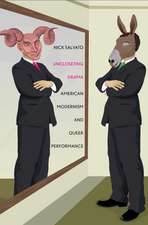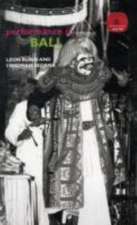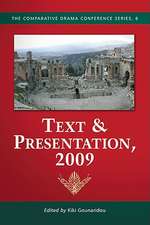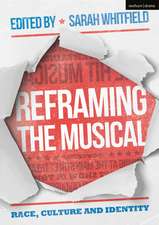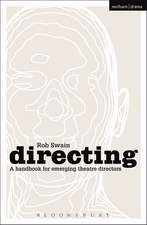An Inconvenient Black History of British Musical Theatre: 1900 - 1950
Autor Sean Mayes, Sarah K. Whitfielden Limba Engleză Paperback – 22 sep 2021
| Toate formatele și edițiile | Preț | Express |
|---|---|---|
| Paperback (1) | 149.46 lei 3-5 săpt. | +30.90 lei 6-12 zile |
| Bloomsbury Publishing – 22 sep 2021 | 149.46 lei 3-5 săpt. | +30.90 lei 6-12 zile |
| Hardback (1) | 469.41 lei 6-8 săpt. | |
| Bloomsbury Publishing – 22 sep 2021 | 469.41 lei 6-8 săpt. |
Preț: 149.46 lei
Preț vechi: 160.77 lei
-7% Nou
Puncte Express: 224
Preț estimativ în valută:
28.60€ • 29.82$ • 23.77£
28.60€ • 29.82$ • 23.77£
Carte disponibilă
Livrare economică 28 februarie-14 martie
Livrare express 13-19 februarie pentru 40.89 lei
Preluare comenzi: 021 569.72.76
Specificații
ISBN-13: 9781350232686
ISBN-10: 1350232688
Pagini: 304
Dimensiuni: 156 x 234 x 21 mm
Greutate: 0.48 kg
Editura: Bloomsbury Publishing
Colecția Methuen Drama
Locul publicării:London, United Kingdom
ISBN-10: 1350232688
Pagini: 304
Dimensiuni: 156 x 234 x 21 mm
Greutate: 0.48 kg
Editura: Bloomsbury Publishing
Colecția Methuen Drama
Locul publicării:London, United Kingdom
Caracteristici
Challenges understanding of what 'British' musical theatre actually is, by readdressing this overlooked key development and the important contribution of non-white performers
Notă biografică
Sean Mayes is a New York music director active both in New York City and Toronto, with a background in London and the UK. He is an active member of the Broadway music community as a vocal coach, accompanist, orchestrator-arranger and pit musician. He is a Part-Time Professor in Musical Theatre at Sheridan College, Canada, and has published on the history of music directing and the role of Black music directors on Broadway. Sarah K. Whitfield is a Senior Lecturer in Musical Theatre at the University of Wolverhampton. Her research focuses on exploring the historiography of musical theatre, and recovering the work that women and minoritised groups have done through archival research and digital humanities. She has published widely on collaborative practice in musical theatre, film musicals, and in queer fan studies. Her most recent book is the edited collection Reframing the Musical: Race, Culture and Identity (2019).
Cuprins
Part I Black practitioners and international performance networks The 1900s in context 1 Will Marion Cook and In Dahomey (1903)2 Belle Davis, Laura Steer and Cassie Walmer The 1910s in context 3 Following a year of Black performance in the UK: 1916 4 Will Garland: Black cultural production on a national stage Part II Black networks of production The 1920s in context 5 The secret Florence Mills Memorial Concert: January 1928 6 Alberta Hunter and Mabel Mercer The 1930s in context 7 Clarence 'Buddy' Bradley and Clarence Robinson Part III Anti-racism and anti-imperialism in London 8 Sam Manning, Amy Ashwood Garvey and 1930s anti-colonialism 9 Swing from Calloway to 'Snakehips' Johnson The 1940s in context 10 Calypso and Black resistance Epilogue
Recenzii
The book opens up many possibilities for future scholars, graduate students, and theatre buffs to engage in recovery work that paints a more accurate portrait of UK theatre and forces us to reconsider the role of white supremacy that has plagued theatre at large . Mayes and Whitfield's book offers a roadmap, a corrective to reframing musical theatre histories in a way that might make us feel like we aren't experts. I, for one, wasn't aware of these histories. They were new to me. I didn't have the knowledge base I typically have when reading and engaging with musical theatre history. But this is precisely the beauty of the book-it offers a learning tool.
This necessary, powerfully anti-racist book provides space and a platform for those artists who might otherwise have been forgotten. It serves as a salient reminder of the wealth of Black performers who should not be consigned to history.
This necessary, powerfully anti-racist book provides space and a platform for those artists who might otherwise have been forgotten. It serves as a salient reminder of the wealth of Black performers who should not be consigned to history.


